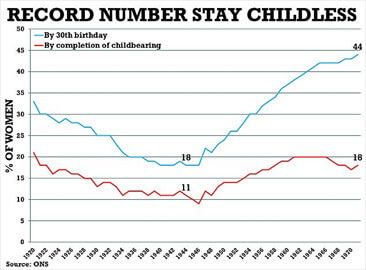Worried about being childless
Published 27th November 2017

On 24th Nov 2017, the Daily Mail reported on the “recent data” published by the ONS (Office for National Statistics), in an article entitled “One in Five Women are Childless at 45” (http://dailym.ai/2i2GQg8). As usual, this type of article grabbed my attention as I have worked in the area of natural fertility for nearly 9 years now. It was quite a complicated article with lots of % statistics and a couple of line charts, so I’ve had a little look behind the data.
Firstly, the data seems to run up to 1971, despite the article talking as though this is data that was taken very recently. However, let’s overlook that small fact for now. We wouldn’t want such a small detail to get in the way of a good news story.
The article reports that 1 in 5 women are childless at 45. According to the ONS in 1930, at age 45 your natural fertile years have come to an end. Let’s put to one side that in 2015, 2119 babies were born to women over the age of 45 (a 33% increase in the last 6 years) and that it is generally assumed that the onset of the menopause (around age 50) is the natural end of your fertile window. But hey, for the purposes of this blog, let’s forget about these years for now.
In the Daily Mail article, it talks about the fact that 44% of women are still childless at age 30. And that this % has dramatically increased since the 1940’s when only 18% of women were childless at 30. Therefore, it concludes that women are having their children later in life. I’m not a historian but know that the 1940’s were obviously a difficult time in our history and it is not surprising that women married earlier and conceived earlier due to the impact of the War. These days women are more likely to continue their education into University, marry later and have their children later. This is not new news, and something that has been reported on many, many times.
What I find really interesting though is that when I look back a few more years, at the data taken in 1920, 34% of women (aged 30) were childless vs 44% in 1971. So, being childless at age 30 is not such a new phenomenon after all. I am sure that the reasons behind the 1920 data are very different to the ones in 1970, but it’s interesting that this data is not shared so publicly.
I am a big fan of the advances in assisted fertility and think that it is an option that anyone struggling with their fertility should consider. But, I absolutely CANNOT stand the pressure put on women and the scaremongering marketing tactics that panic women about their fertility. To use this out of date data in a way in which to draw attention to a “rapidly increasing childlessness’ is in my opinion, just mean. The women that I see in my clinic are often extremely worried about their fertility, quality of their eggs, stress levels, age etc It’s really not helpful to show them more worrying, misrepresented information.
Strangely enough, on the same day in the Daily Mail, not two stories apart, is an article about how the singer Rita Ora (age 27) has reportedly frozen her eggs (that’s a rant for another day). “That’s odd” I thought, two articles highlighting women’s fertility on the same page? And then my sceptical brain remembered, there are no such things as coincidences. And there it was: A large advertisement for some kind of “at home fertility treatment”. GOOD GRIEF!! I don’t know why I am shocked, I see this all the time. Companies that like to scare women about their fertility for profit.
So let me put a few things straight.
- The % of women who are childless at age 30 has increased marginally between 1920 and 1971. Not a big enough increase for someone to report this in the Daily Mail as it doesn’t make a shocking enough story.
- The % of women who are childless at age 45 has remained approximately the same since 1920 (21% in 1920 vs 18% in 1970), no dramatic increase of infertility at all.
- When we hear about information which shows a declining level of fertility after the age of 35, this is usually taken from IVF clinic data. It is not data taken from the general population. ie women who are having IVF treatments and are over the age of 35 have a declining level of success. Possibly because they have underlying medical conditions and have already tried to conceive for a number of years. It is not accurate to apply this to the rest of the population.
Please Please Please stop worrying about your fertility. I know it is really hard to do, I have been there. Be sensible about your health. Eat properly. Give yourself enough rest and sleep. Do whatever you can try to reduce your stress levels. Exercise moderately. Be kind to yourself. If you have problems with your menstruation or ovulation consult a GP or natural fertility expert. But please STOP being influenced by articles which are there to panic you into spending money on fertility products.
Gabby Lamplugh
Director at Pink Lotus Acupuncture

